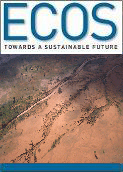
|
Published: 26 November 2012
Climate change denial and the illusion of consensus
In a recent blog post, respected US scientist and author of The Inquisition of Climate Science, James Lawrence Powell, analysed peer-reviewed scientific articles on climate change published between January 1991 and November 2012. The search produced 13,950 articles, of which just 24 clearly rejected the theory of global warming, or endorsed a cause other than CO2 emissions.
So what? Powell wanted to challenge the growing public belief that scientists substantially disagree about human-caused global warming. As he asserts, ‘Scientists do not disagree about human-caused global warming. It is the ruling paradigm of climate science, in the same way that plate tectonics is the ruling paradigm of geology.’
In a recent paper published in the journal Nature Climate Change, CSIRO researchers reported that Australians, too, hold views that are at odds with reality.
The aim of the CSIRO study – in which over 5000 people were surveyed over two years – was to investigate biases in people’s opinions about the existence and causes of climate change.
The researchers classified survey respondents into four different groups: those who believe climate change is not happening; those who ‘don’t know’ if climate change is happening or not; those who believe climate change is happening but is due to natural causes; and those who believe climate change is happening and is largely human-induced.
Results showed that respondents in all four categories overestimated the proportion of people who deny climate change is happening – despite the fact that most of the respondents agreed that climate change is happening.
The authors suggest that media reporting styles and the influence of big-industry opinion have influenced the community’s opinions, contributing to the bias.
According to lead author, Zoe Leviston, the study’s findings are consistent with what is already widely known in psychology – that humans generally are poor judges of how widespread their own and others’ opinions are.
Ms Leviston says people find it hard to judge the prevalence of opinions, on climate change or other issues. This leads to the ‘false consensus effect’ – a tendency to overestimate how common one’s own opinion is – and ‘pluralistic ignorance’ where most people privately reject an opinion, but assume incorrectly that most others accept it.
‘The false consensus effect was stronger among the minority groups, those who denied or were undecided about the existence of climate change,’ said Ms Leviston.
‘In contrast, those whose opinions together formed the majority view – that climate change is due to “natural” or “human-induced” causes – underestimated the level of agreement with their own opinion.’
Intriguingly, the study found that people who supported the view that climate change is happening – whether due to natural or human causes – will engage in more pro environmental behaviours that those who deny or are undecided about climate change.
Further, those who accept the idea of climate change think the impacts of climate change will be more severe, and feel a greater moral obligation to respond, than do those who think climate change is not happening.
The message for scientists and science communicators, says Ms Leviston, is the need to alert Australians to these biases, in the hope that those who accept climate change but feel in the minority will be more confident about taking action, while less effort should be directed at persuading climate change ‘denialists’ to change their views.
Listen to Zoe discuss her research here




